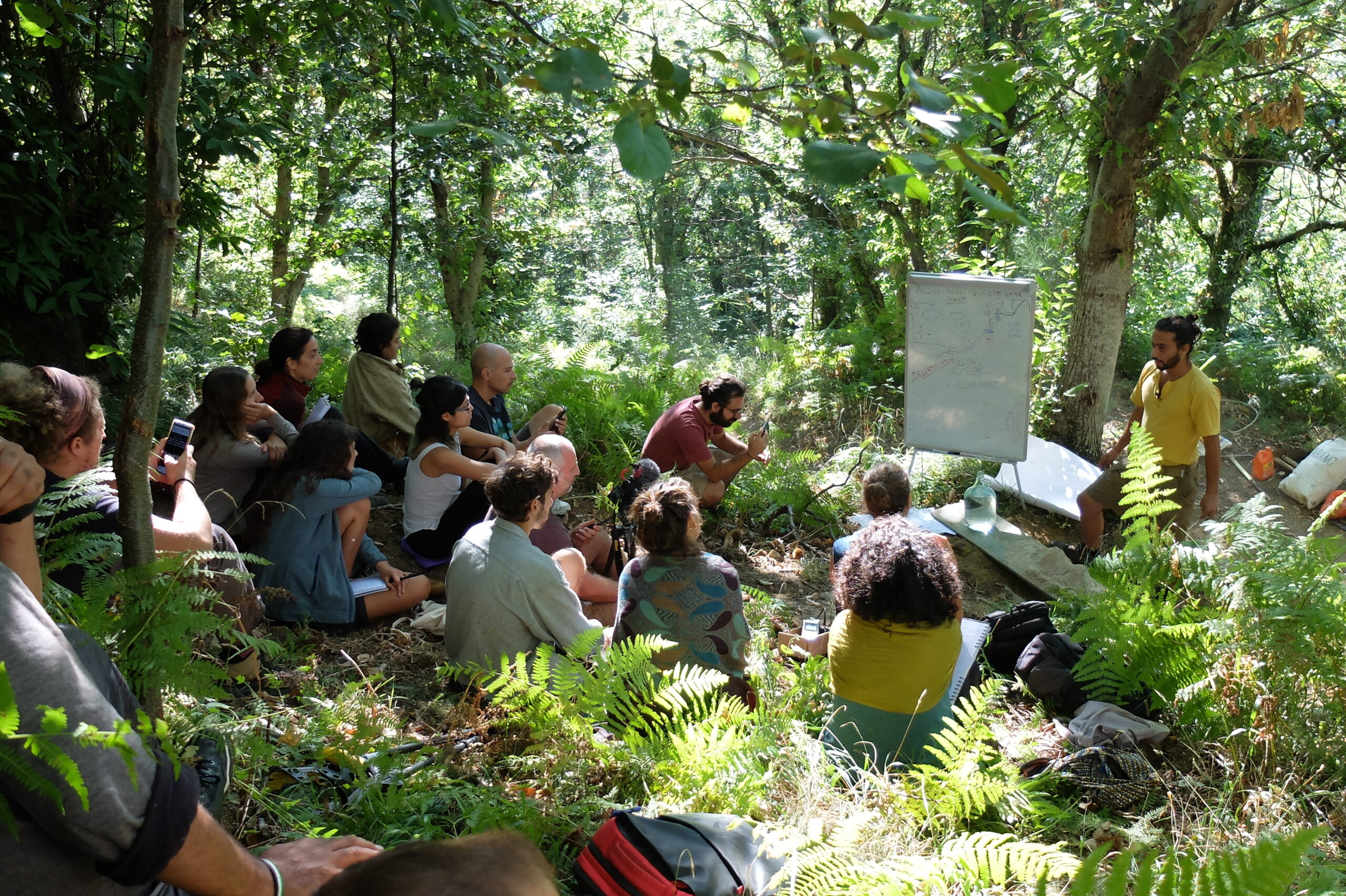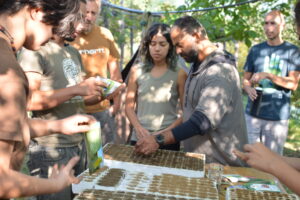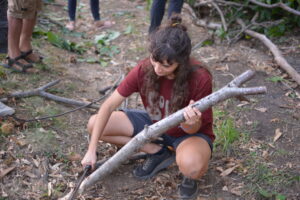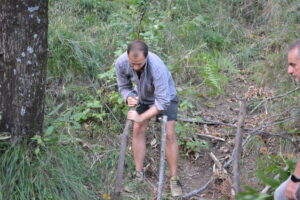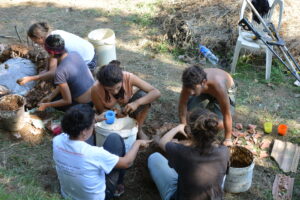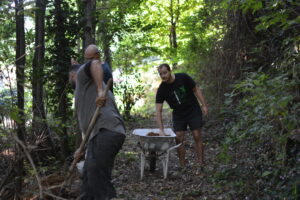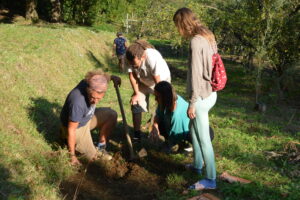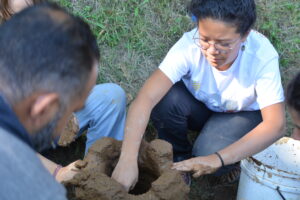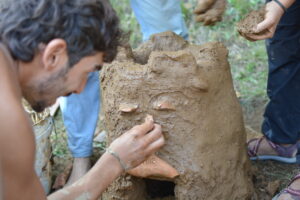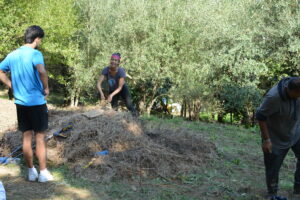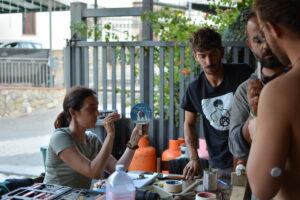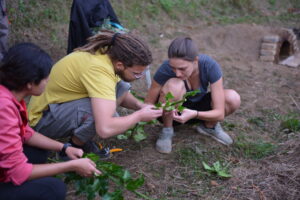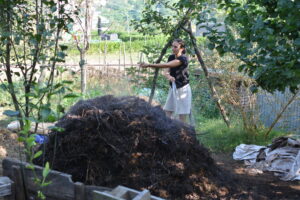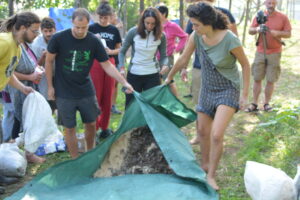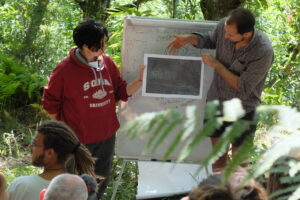The constantly involving climate change causes us humans to rethink our way of producing food or generally the way we live our lives. Globally many regions that are used for food production suffer from drought or flooding which increases the interruptions in our global food chain. Furthermore, the United Nations (UN) expects the world population to increase up to 10.4 billion people until 2080 which forces humanity to find a sustainable or even regenerative way of agriculture.
That is why our organisation Acarbio, operating in the area of Tramonti and the Amalfi Coast trying to protect the local nature and traditions, organized an Erasmus+ funded project called Green Paths that consisted of a two-week training course about Permaculture.
In this adventure Acarbio partnered with “Cob.gr”, a Greek organisation that has extensive experience in permaculture, having developed their own eco-farm living in a small community of 10 people. From this organisation two trainers were on site and led the activities throughout the whole project. The other partners involved, which shared common aims and objectives concerning sustainable development, were Zeleno Doba from Serbia and Green School Village from Bulgaria. Altogether 22 participants from Bulgaria, Italy, Serbia and Greece were hosted in Tramonti (Italy) from 2 to 15 October 2023.
Permaculture is a regenerative way of living. The focus lies on creating symbioses, using “waste” or previously unused resources and including them into the natural circulation. Concretely this means for example improving the water management to catch all the rainwater, planting crops that complement each other and organising a garden in the most efficient way with short routes to daily used tools.
But Permaculture is not only about agriculture. It also involves social aspects like sharing resources equally. As climate change has an impact on all the planet it is important to act united and tackle it together.
But what activities were organised to teach the participants? With a mix of theoretical and practical sessions the training course gave important tools to the participants for implementing the knowledge in their own garden or in future projects. The practical part consisted of constructing usable equipment like stone ovens, solar ovens or wooden barriers in the nearby chestnut forest by using only materials that could be found in the nearby area.
In addition, the participants learned the best way to treat their crops and plants and trained planting the seedlings into the soil.
To also improve the soil, different types of compost were created like a worm compost and a hot compost.
Not only the project brought together organisations from all over Europe but also brought together local organisations from the area linked to sustainable lifestyles. In fact the informal youth group of “The Greeners Youth Club of Amalfi Coast” was there as well, with the aim of understanding why permaculture is such an important part to tackle climate change. With their help, the participants were taken for a visit in the traditional terraced agriculture field sand gained important information about how locals cultivate their fields.
The inhabitants of the beautiful Amalfi Coast are especially used to coping with natural difficulties. The coast is known for the characteristic steep cliffs that could not be used for agriculture in the past. But people adapted to their conditions and created the famous terraces that are known all over the world. With this solution the people were able to use this area for producing food. Forming these terraces is also a form of Permaculture as this allows water to spread evenly and gives the water enough time to soak into the soil. Water is used in the most efficient way possible.
Permaculture therefore protects the local landscape, increases biodiversity and also provides the local people with a new way of thinking and doing agriculture.
Throughout the project participants packed themselves with a lot of theoretical and practical knowledge that finally could use to develop their own permaculture projects during an intensive group working session in the last days. The projects were based on real world scenarios from plot of lands brought by the participants with the aim to implement them in the future for themselves. Furthermore they could develop a video tutorial useful in their activities of youth workers.
After the end of the project the participants left with a big luggage of knowledge, experience, and with a new family. In addition, they received a certificate on permaculture (PDC).
Results and dissemination
Results
The training course consisted of 12 full days in which participants got to learn and experiment with topics like grafting, worm farms, compost tea, water management in the mountain chestnut forest, DIY mountain contour measuring tools, Teku Cana compost techniques and so much more, in application with their youth work. So the Green Paths project was particularly rich in products created by the participants.
- Padlet Green Paths: During the project, a padlet was created, https://padlet.com/rei1985/green-paths-m16159ft71xhd0ul. This was crucial in organising the training and collecting all results.
- Notes: Introductory Guide about permaculture priciples: https://www.acarbio.org/wpcontent/uploads/2023/12/GreenPaths%20textbook.pdf
- Interactive video tutorial: This tutorial is available on an e-learning platform https://e-rescue.eu/mod/hvp/view.php?id=203 (it can be accessed also as a guest)
After all the theory and practice, participants concluded the training by designing their own permaculture gardens and presenting it to the trainers.
In fact to finish the training course the participants were divided into 4 groups and worked on four different Permaculture designs which have been presented to the other participants and the trainers. This activity served as a way to visually measure all the acquired information and the participants put all their effort to present the best idea and design to apply to different areas. In fact in order to design their own permaculture garden they used footage of their sites as an area to design.
The designs can be seen here:
Sara’s farm
Tara boombastic + 3d video
Chestnut forest
3S Symphonia
Hot compost
Dissemination
Because of the big number of activities, participants and coordinators created a lot of content to be published on Social Media in order to spread knowledge on permaculture.
Moreover the partner Green School Village was the video-recording team and recorded all the sessions.
Here the links to Acarbio’s Instagram and Facebook posts:
- https://www.instagram.com/p/Cx_cHqSrFbX/?igshid=NGEwZGU0MjU5Mw==
- https://www.instagram.com/p/CyJE3_usDBi/?igshid=ODhhZWM5NmIwOQ==
- https://www.instagram.com/p/Cx_cHqSrFbX/?igshid=ODhhZWM5NmIwOQ==
- https://www.instagram.com/p/CyTr2O6reA4/?igshid=ODhhZWM5NmIwOQ==
- https://www.instagram.com/p/CyyNWcBMvr8/?igshid=ODhhZWM5NmIwOQ==
- https://www.instagram.com/p/Cy2yP9usBNY/?igshid=ODhhZWM5NmIwOQ==
- https://www.instagram.com/p/CzCBcRWLJ0z/?igshid=ODhhZWM5NmIwOQ==
- https://www.instagram.com/p/CzD5yx8MuaE/?igshid=ODhhZWM5NmIwOQ==
- https://www.facebook.com/share/p/vsVwAjiJjxpT1tuu/
- https://www.facebook.com/share/p/eCu3XBfjRJgTxyPF/
- https://www.facebook.com/share/p/PsYWQPSZP8Djun4y/
- https://www.facebook.com/share/p/1kHB9J43PBLvom53/
- https://www.facebook.com/share/p/QPJsH4TUqRUpB1Km/
- https://www.facebook.com/share/p/75GPxKRemDGmRCmH/
– The partner Cob from Greece also shared posts to spread the outcomes of the training and raise awareness on Instagram and Facebook. Additionally, they shared the permaculture designs created during the training and videos of sessions held by Christos Karystinos during the training on YouTube:
- https://www.instagram.com/p/CzD5yx8MuaE/?igshid=ODhhZWM5NmIwOQ==
- communitylab.gr – A lab for community life / A community lab: From talking to social design – YouTube
- Sociocracy 3.0: Facilitating a Consent Decision Making – Permaculture Design Course by Community Lab – YouTube
- https://www.facebook.com/share/p/kpH58pmH6AQX1E36/
- https://drive.google.com/drive/u/1/folders/1hB66dzNYGbyaBTdKvk3_1Sn9ROsOWqvt
- https://www.youtube.com/watch?v=beXpo-8KU3Y
- https://www.youtube.com/watch?v=Sk_LFRe106M&t=152s
- https://www.youtube.com/watch?v=LaWSpXfSyf0
– “The Greeners” shared a video interview with Christos Kontomanos about his connection and thoughts about permaculture on YouTube:

